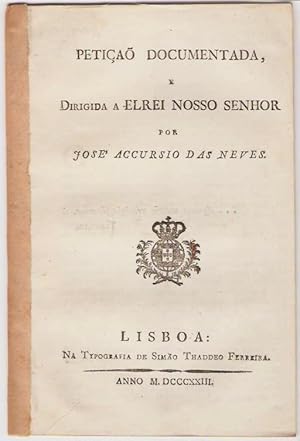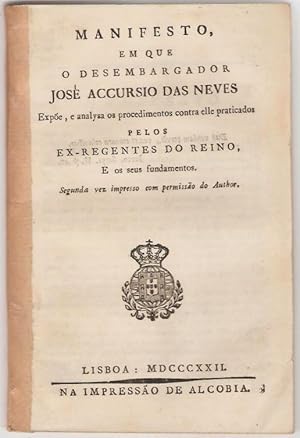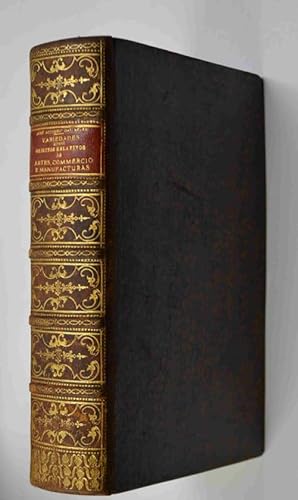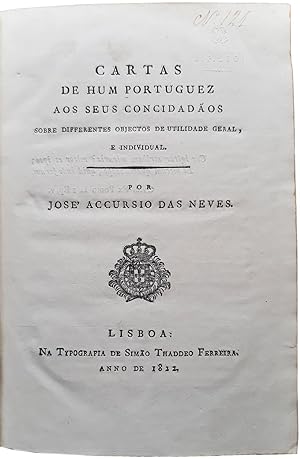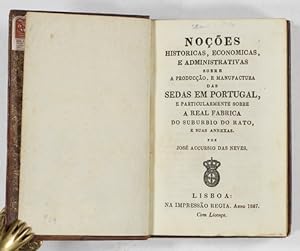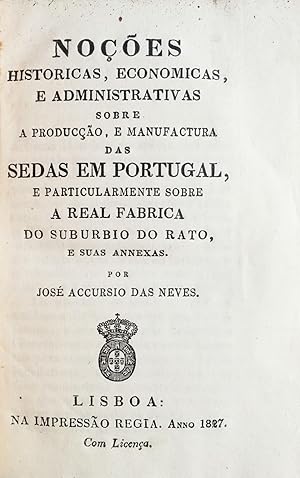ACCURSIO DAS NEVES JOSE (14 risultati)
Tipo di articolo
- Tutti gli articoli
- Libri (14)
- Riviste e Giornali
- Fumetti
- Spartiti
- Arte, Stampe e Poster
- Fotografie
- Mappe
-
Manoscritti e
Collezionismo cartaceo
Condizioni
Legatura
Ulteriori caratteristiche
- Prima edizione (8)
- Copia autografata
- Sovraccoperta
- Con foto (8)
- No print on demand (13)
Spedizione gratuita
Paese del venditore
Valutazione venditore
-
Consideracoes politicas, e commerciaes sobre os descobrimentos e possessoes dos portuguezes na . [LeatherBound]
Data di pubblicazione: 2023
Da: True World of Books, Delhi, India
Libro Print on Demand
LeatherBound. Condizione: New. LeatherBound edition. Condition: New. Reprinted from 1830 edition. Leather Binding on Spine and Corners with Golden leaf printing on spine. Bound in genuine leather with Satin ribbon page markers and Spine with raised gilt bands. A perfect gift for your loved ones. NO changes have been made to the original text. This is NOT a retyped or an ocr'd reprint. Illustrations, Index, if any, are included in black and white. Each page is checked manually before printing. As this print on demand book is reprinted from a very old book, there could be some missing or flawed pages, but we always try to make the book as complete as possible. Fold-outs, if any, are not part of the book. If the original book was published in multiple volumes then this reprint is of only one volume, not the whole set. Sewing binding for longer life, where the book block is actually sewn (smythe sewn/section sewn) with thread before binding which results in a more durable type of binding. Pages: 433 Language: Portuguese.
-
Petiçao documentada, e dirigida a Elrei nosso Senhor.
Editore: Na typograpfia de Simao Thaddeo Ferreira, 1823
Da: Rometti Vincent, Nice, Francia
Prima edizione
Couverture souple. Condizione: Très bon. Edition originale. Lisboa, Na typograpfia de Simao Thaddeo Ferreira, 1823. Plaquette brochée (187x125mm), dos factice, 28pp. Une brunissure sur la couverture, très bel état.
-
História geral da invasâo dos francezes em Portugal e da Restauraçâo desde Reino. TOMO V.
Editore: Lisboa, Officina de Simâo Thaddeo Ferreira, 1811, 1811
Da: Librería Anticuaria - José Manuel Valdés, OVIEDO, AST, Spagna
15,5 x 11 cm. 313 pp. Es solo el Tomo V de esta apreciada obra. Con ex libris de Annibal Fernandez Thomas, un gran bibliógrafo portugués del siglo XIX. encuadernación de época, holandesa piel. Bien conservado (la piel del lomo, con dos pequeñas faltas). GUERRA PENINSULAR. GUERRA DE LA INDEPENDENCIA. PORTUGAL ALB-9-17.
-
Petiçaõ Documentada, e Dirigida a Elrei Nosso Senhor.
Editore: LISBOA: Na Typografia de Simão Thaddeo Ferreira. Anno 1828., 1828
Da: Paul Orssich HISPANIC STUDIES, LONDON, Regno Unito
8vo mayor. Contemporary wraps, upper cover detached; some wear.28 pp.On the affairs of the Companhia Geral da Agricultura das Vinhas do Alto Douro.COPAC records only one copy, in BL. Innocencio IV p.181 & 458.
-
A Voz do Patriotismo na Restauração de Portugal, e Hespanha.
Editore: LISBOA: Na Of. de Simão Thaddeo Ferreira. Com Licença de S.A.R. 1808., 1808
Da: Paul Orssich HISPANIC STUDIES, LONDON, Regno Unito
8vo. Later printed wrappers.29 pp.Scarce.Ayres I p.20. Innocencio IV p.181. CCPBE records ONE copy. COPAC one copy.
-
Manifesto, em que o desembargador. Expoe, e analysa os procedimentos contra elle praticados pelos ex-Regentes do Reino, e o seus fondamentos. Segunda vez impresso com permissao do author.
Editore: Na impressao de Alcobia, 1822
Da: Rometti Vincent, Nice, Francia
Couverture souple. Condizione: Très bon. 2ème Édition. Lisboa, Na impressao de Alcobia, 1822. Plaquette brochée (187x123mm), dos factice, 72pp. Quelques infimes rousseurs. Très bel exemplaire.
-
Memoria sobre alguns acontecimentos mais notaveis da administração da Real Fabrica das Sedas desde o anno de 1810, e sobre os meios do seu restabelecimento, dirigida a Corte do Rio de Janeiro, e ao Governo de Portugal no anno de 1819.
Editore: Lisbon, Na Officina de Simão Thaddeo Ferreira, 1821., 1821
Da: Richard C. Ramer Old and Rare Books, New York, NY, U.S.A.
Prima edizione
4°, plain blue rear wrapper (front wrapper missing). Faintly dampstained at top toward end. In good to very good condition. 44 pp. *** FIRST and ONLY EDITION. The author had been trying since 1810 to persuade the government to reform the way it ran the royal silk factory. He gives a lengthy history of the government's decrees regarding the factory (pp. 7-28), then discusses how the factory can be revived, whether private silk factories should be permitted, warehouses, accounting, and inspections. In the introduction, Accursio das Neves states that he was spurred to write this Memoria by a notice in the Diario do Governo of September 22, 1821.Accursio das Neves (1766-1834), a noted economist, held various government posts; his writing was primarily concerned with the political implications of commerce. Elected a member of the Real Academia das Sciencias de Lisboa in 1810, he was a defender of absolutism, being one of the principle supporters of D. Miguel in the Côrtes of 1828. As an absolutist, he had been opposed to the liberal ideology behind the revolution of 1820, and the 1822 constitution. On May 14, 1821 he lost his government offices, only to be reinstated in June 1823. Nevertheless, Neves was elected deputy to the Côrtes of 1822. The years 1821-1828 saw the maturing of his political-economic development. Despite the ultra conservative approach to politics, Neves favored industrialization and free trade (while defending a moderate protectionism). As a result of his support for Miguelismo, Neves became an obscure figure after the liberals triumphed toward the end of his life. Today he is regarded as one of the most brilliant Portuguese thinkers and most lucid prose writers of his age - a precursor of modern economic theory in Portugal.*** Innocêncio IV, 181, 458; XII, 196. Biblioteca Pública de Braga, Catálogo do Fundo Barca-Oliveira, p. 181. Kress, Luso-Brazilian Economic Literature Before 1850, p. 10. On the author, see Laranjo, Economistas portugueses pp. 89-94. Not in JCB, Portuguese and Brazilian Books. Porbase locates two copies, both in the Biblioteca Nacional de Portugal. Jisc repeats British Library and Victoria and Albert. KVK (51 databases searched) adds Haifa University. NUC: MH-BA.
-
Memoria sobre alguns acontecimentos mais notaveis da administração da Real Fabrica das Sedas desde o anno de 1810, e sobre os do seu restabelecimento, dirigida a Corte do Rio de Janeiro, e ao Governo de Portugal no anno de 1819.
Data di pubblicazione: 1821
Da: Antiq. F.-D. Söhn - Medicusbooks.Com, Marburg, Germania
Libro
Lisbon, Na Officina de Simão Thaddeo Ferreira, 1821, 4°, 44 pp., wrappers; fine copy. First and Only Edition! The factory dated back to 1735 when a large building was erected to house it. By 1745 it was already running at a loss, but was revived under Pombal. One of Portugal's foremost economists of the early 19th century, the author was appointed Director of the Royal Silk Factory in 1810. He complains of gross irregularities on the accounting system, the decision to sell the looms, the lack of raw silk for weaving, and he expresses his frustration that, since Portugal was isolated during the Peninsula War, textile manufacture was not prioritized and pointed out that the British army was buying Portuguese cloth. The factory could have diversified its production There were fewer looms, general apathy prevailed and the workforce was demoralized. For years the factory had been losing money, its losses caused by its bad management and superfluous officials. He recommends the appointment of agents to promote its wares, especially in Le Havre, Marseilles and Genoa. The Junta do Comerao (Board of Trade) was responsible for the administration of the factory, and in 1810 Acúrsio das Neves had become a deputy there, remaining as its secretary until dismissed in 1821, and he was a member of the Lisbon Royal Academy of Sciences. Though written in 1819, the work was not published until 1821, after his dismissal from the post; in 1817 he had pleaded for more investment in the factory (Variedades sobre objectos relativos ds artes, commércio e mamifacturas, vol. II, p 319). He had in 1820 published his Memoria sobre os maos de melhorar a indústria portugueza. Writing in the early 19th century, Adrien Balbi "praised the silks of Portugal as 'remarkable for their variety which imitate perfectly those of Lyons'" (Maxwell, Conflicts and Conspiracies: Brazil & Portugal 1750-1808, p.56). Innocêncio IV, 182. Azevedo-Samodaes 29, "interessante e estimada, pouco frequente." Monteverde 24, "pouco vulgar." WorldCat lists 4 copies.
-
Entretenimentos cosmologicos, geographicos, e historicos. Tomo I [all published].
Editore: Lisbon, Na Impressão Regia, 1826., 1826
Da: Richard C. Ramer Old and Rare Books, New York, NY, U.S.A.
Prima edizione
8°, contemporary mottled sheep (some wear; split of about 3.5 cm. to front outer joint near head of spine; five tiny round wormholes to outer joints), smooth spine gilt, crimson morocco lettering piece, gilt short title, marbled endleaves, text block edges sprinkled red. Woodcut Portuguese royal arms on title page. In very good condition overall. Later rectangular green stamp on front free endleaf recto giving shelf location and number "6227" in ink manuscript. Old (contemporary?) owner's signature on title page, with "e // o unico publicado" in ink manuscript to its left, following and below the printed "Tomo I". Manuscript notation, apparently in code, and apparently in the same hand as the title page signature, in ink manuscript on rear free endleaf verso. viii, 382 pp., (1 l.). *** FIRST EDITION. The text appeared again in the author's Obras completas, [1987?], where it was included in his "Escritos patrióticos". While there may be some subtle connection to patriotism or politics, the work appears to follow its title, dealing with an overview of cosmological and geographical knowledge from an historical point of view. There are chapters on the Earth, stars, planets, the solar system, celestial physics, movement of the Earth, comets, Buffon's theory of the formation of planets, other theories regarding the formation of planets, the shape and size of Earth, other geological considerations about the terrestrial globe, volcanic phenomena, on the origins and causes of subterranean fires and earthquakes, geography of volcanos, volcanos of the Açores (2 chapters), islands formed by volcanos and the so-call Altantis, some memorable earthquakes, meteorites, iron, and other substances which fall to Earth through the atmosphere, a catalogue of falling stones, iron, and other meteoric material, and finally general considerations about fluids which form part of the otherwise solid terrestrial globe.José Accursio das Neves (1766-1834), a noted economist, held various government posts; his writing was primarily concerned with the political implications of commerce. Elected a member of the Real Academia das Sciencias de Lisboa in 1810, he was a defender of absolutism, being one of the principle supporters of D. Miguel in the Côrtes of 1828. As an absolutist, he had been opposed to the liberal ideology behind the revolution of 1820, and the 1822 constitution. On May 14, 1821 he lost his government offices, only to be reinstated in June 1823. Nevertheless, Neves was elected deputy to the Côrtes of 1822. The years 1821-1828 saw the maturing of his political-economic development. Despite the ultra conservative approach to politics, Neves favored industrialization and free trade (while defending a moderate protectionism). As a result of his support for Miguelismo, Neves became an obscure figure after the liberals triumphed toward the end of his life. Today he is regarded as one of the most brilliant Portuguese thinkers and most lucid prose writers of his age - a precursor of modern economic theory in Portugal.*** Innocêncio IV, 182 (without reference to the final unnumbered leaf); XVIII, 249; see pp. 181-3, 458-9; XII, 196-7; XVIII, 249 for biographical details and other works. On the author, see Laranjo, Economistas portugueses pp. 89-94. Porbase locates six copies: four in the Biblioteca Nacional de Portugal, and one each in the Fundação Calouste Gulbenkian, and the Biblioteca João Paulo II-Universidade Católica Portuguesa. Jisc repeats British Library only.
-
Considerações politicas e commerciaes sobre os descobrimentos, e possessões dos Portuguezes na Africa, e na Asia.
Editore: Lisbon, Na Impressão Regia, 1830., 1830
Da: Richard C. Ramer Old and Rare Books, New York, NY, U.S.A.
Prima edizione
8°, contemporary mottled sheep (some minor worming to joints, 2 cm. tear at head of spine and front cover), flat spine with gilt bands and red morocco lettering piece, short title gilt, text block edges speckled red. Woodcut royal Portuguese arms on title page. Internally fine, overall condition very good. Early signature in blank portion of title page ("J. Leite R. Freire"?). 420 pp. *** FIRST EDITION. Focuses with historical perspective on the commerce and politics of the Cape Verde Islands, São Thomé and Príncipe, Angola, Moçambique and Goa. José Accursio das Neves (1766-1834), a noted economist, held various government posts; his writing was primarily concerned with the political implications of commerce. Elected a member of the Real Academia das Sciencias de Lisboa in 1810, he was a defender of absolutism, being one of the principle supporters of D. Miguel in the Côrtes of 1828. As an absolutist, he had been opposed to the liberal ideology behind the revolution of 1820, and the 1822 constitution. On May 14, 1821 he lost his government offices, only to be reinstated in June 1823. Nevertheless, Neves was elected deputy to the Côrtes of 1822. The years 1821-1828 saw the maturing of his political-economic development. Despite the ultra conservative approach to politics, Neves favored industrialization and free trade (while defending a moderate protectionism). As a result of his support for Miguelismo, Neves became an obscure figure after the liberals triumphed toward the end of his life. Today he is regarded as one of the most brilliant Portuguese thinkers and most lucid prose writers of his age - a precursor of modern economic theory in Portugal.*** Innocêncio IV, 182. Figaniere, Bibliographia historica portugueza 1013. Not in Kress. Not in Kress, Luso-Brazilian Economic Literature before 1850. On the author, see Laranjo, Economistas portugueses, pp. 89-94. Porbase locates a single copy, at Biblioteca João Paulo II-Universidade Católica Portuguesa. Jisc locates a copy each at British Library, Oxford University, Senate House Libraries-University of London, and Cambridge University.
-
Variedades sobre objetos relativos as Artes, Comercio, e Manufacturas, consideradas segundo os Principios da Economia Politica&
Editore: na Impressao Regia, 1814-17, Lisboa,, 1814
Da: Studio Bibliografico Benacense, Riva del garda, Italia
Prima edizione
Due volumi legati in uno di cm. 21, pp. 293 (1); 335 (1). Solida ed elegante legatura d'epoca postriore in piena pelle, dorso a nervi con ricchi fregi e titoli in oro. Solo poche iniziali con radi segni a penna, un'ininfluente macchietta marginale a poche carte centrali, peraltro esemplare ben conservato. Prima edizione, non comune, di questo siginficativo trattato di economia portoghese con accenni anche al Brasile.
-
Cartas de hum portuguez aos seus concidadãos sobre differentes objectos de utilidade geral, e individual.
Editore: Lisbon, Na Typografia de Simão Thaddeo Ferreira, 1822-1823., 1823
Da: Richard C. Ramer Old and Rare Books, New York, NY, U.S.A.
Prima edizione
2 volumes in 1. 4°, contemporary tree sheep (minor wear), smooth spine gilt, crimson morocco lettering piece, gilt letter, marbled endleaves. Woodcut Portuguese royal arms on title pages. Overall in very good to fine condition. Old ink manuscript inscription "N.º 121" in upper outer corner of first title page. Circular white paper ticket with blue border and "481" supplied in ink manuscript in upper outer corner of front pastedown endleaf. 216 pp. *** FIRST EDITION. The text appeared again in the author's Obras completas, [1987?]. It consists of 27 "Cartas". Beginning on p. [65] is a divisional title page, dated 1823, titled Continuação das Cartas aos Portugezes escriptas por José Accursio das Neves.This book attempts to foster the political economy while opposing the new constitutional system. There is much derogatory comment on the French and American revolutions, buttressed with references to Rousseau, Voltaire, Raynal, classical authors, and the Bible. On pp. 7-8 of the first part, the author refers to Portuguese shipping on the high seas, intended promote Brazilian sugar, coffee, and cotton, which will be traded for wines of the Alto Douro, plums from Traz-os-Montes, and figs from the Algarve. On p. 69 is a reference to Brazilian independence. This is further discussed in "Carta XII: o desmembramento da monarquia" on pp. [89]-96. Cartas XV, XVI, and XVII, pp. [113]-136 deal with "Effeitos da regeneração pelo que respeita a industria".Accursio das Neves (1766-1834), a noted economist, held various government posts; his writing was primarily concerned with the political implications of commerce. Elected a member of the Real Academia das Sciencias de Lisboa in 1810, he was a defender of absolutism, being one of the principle supporters of D. Miguel in the Côrtes of 1828. As an absolutist, he had been opposed to the liberal ideology behind the revolution of 1820, and the 1822 constitution. On May 14, 1821 he lost his government offices, only to be reinstated in June 1823. Nevertheless, Neves was elected deputy to the Côrtes of 1822. The years 1821-1828 saw the maturing of his political-economic development. Despite the ultra conservative approach to politics, Neves favored industrialization and free trade (while defending a moderate protectionism). As a result of his support for Miguelismo, Neves became an obscure figure after the liberals triumphed toward the end of his life. Today he is regarded as one of the most brilliant Portuguese thinkers and most lucid prose writers of his age - a precursor of modern economic theory in Portugal.*** Innocêncio IV, 182 (without collation); IV, 459 (stating that the book contains 216 pp.); XII, 197 (calling in error for 217 pp.); see pp. 181-3, 458-9; XII, 196-7; XVIII, 249 for biographical details and other works. Not in Biblioteca Pública de Braga, Catálogo do Fundo Barca-Oliveira. On the author, see Laranjo, Economistas portugueses pp. 89-94. Porbase locates nine copies: six in the Biblioteca Nacional de Portugal (one in poor condition), two at the Biblioteca João Paulo II-Universidade Católica Portuguesa, and one in the Biblioteca Central da Marinha. Not located in Jisc. *** BOUND WITH: NEVES, José Accursio das. Petição documentada, e dirigida a ElRey Nosso Senhor. Lisbon: Na Typografia de Simão Thaddeo Ferreira, 1823. 4º, woodcut Portuguese royal arms on title page, 28 pp. Overall in very good to fine condition.FIRST and ONLY EDITION. Relates to the reinstatement of José Accursio das Neves into the administration of the Companhia Geral da Agricultura das Vinhas do Alto Douro. * Innocêncio IV, 458. Biblioteca Pública de Braga, Catálogo do Fundo Barca-Oliveira, p. 181.
-
Noções historicas, economicas, e administrativas sobre a producção, e manufactura das sedas em Portugal, e particularmente sobre a Real Fabrica do suburbio do Rato, e suas annexas.
Data di pubblicazione: 1827
Da: Antiq. F.-D. Söhn - Medicusbooks.Com, Marburg, Germania
Libro Prima edizione
Lisbon, Na Impressão Regia, 1827, 8°, VII, 405 pp., 1 f., contemporary calf; fine copy. First edition of this detailed and well-documented history of silk production in Portugal, with special emphasis of that of the Royal Silk Factory. The factory began production in 1735, but by 1745 it was already running at a loss, and was revived under Pombal. "In 1757 the junta do comércio took over the bankrupt silk factory in the Lisbon suburb of Rato. The factory had been founded during the thirties by Cardinal da Mota and two French entrepreneurs, Robert Godin and Sibert. Capital had been raised, a company formed, and a large building constructed. The early years had been difficult and during the forties the company's deficits were considerable. The royal takeover placed the junta do comércio in supreme control. . Instead of large capital expenditure on plant and equipment such as undertaken at the foundation of the silk factory of Rato, (Pombal) had seen industrial concentrations grow from individual units where initially a small outlay only had been necessary and returns immediate . . independent producers were integrated with the factory for marketing and dependent on it for their supply of raw materials" (Maxwell, Conflicts and Conspiracies: Brazil & Portugal 1750-1808, p. 51-52). Ownershin stamps on title p., pp, 1&15. Some pencilled annotations. Innocêncio IV, 182 & VIll, 405. Azevedo-Samodâes 30. Ameal 16.
-
Noções historicas, economicas, e administrativas sobre a producção, e manufactura das sedas em Portugal, e particularmente sobre a Real Fabrica do suburbio do Rato, e suas annexas.
Editore: Lisbon, Na Impressão Regia, 1827., 1827
Da: Richard C. Ramer Old and Rare Books, New York, NY, U.S.A.
Prima edizione
8°, contemporary crimson quarter calf over marbled boards (corners a bit worn), spine with black leather lettering piece), gilt letter, orange endleaves, text-block edges sprinkled. Clean and crisp. In fine condition. vii, 405 pp., (1 l.). *** FIRST EDITION of a useful, well documented work on the production of silk in Portugal, especially at the factory in the Rato, established in the 1730s on what was then the outskirts of Lisbon. Neves describes the progress of that factory under various administrations, government support of the factory, the addition of facilities for dyeing and design, the cultivation of silkworms, and the changes made by Piedmontese immigrants. Chapters XIV-XIX (out of 27) deal with other industries in Portugal, including tapestries, hat-making, stucco, locksmiths, combs, cardboard boxes, varnish, watches, crockery, buttons, and decanters.Accursio das Neves (1766-1834), a noted economist, held various government posts; his writing was primarily concerned with the political implications of commerce. Elected a member of the Real Academia das Sciencias de Lisboa in 1810, he was a defender of absolutism, being one of the principle supporters of D. Miguel in the Côrtes of 1828. As an absolutist, he had been opposed to the liberal ideology behind the revolution of 1820, and the 1822 constitution. On May 14, 1821 he lost his government offices, only to be reinstated in June 1823. Nevertheless, Neves was elected deputy to the Côrtes of 1822. The years 1821-1828 saw the maturing of his political-economic development. Despite the ultra conservative approach to politics, Neves favored industrialization and free trade (while defending a moderate protectionism). As a result of his support for Miguelismo, Neves became an obscure figure after the liberals triumphed toward the end of his life. Today he is regarded as one of the most brilliant Portuguese thinkers and most lucid prose writers of his age - a precursor of modern economic theory in Portugal.*** Innocêncio IV, 182 (without mention of the final leaf, a table of contents). Kress, Luso-Brazilian Economic Literature Before 1850, pp. 14-5. On the author, see Laranjo, Economistas portugueses pp. 89-94. Porbase locates four copies, all at Biblioteca Nacional de Portugal.


![Immagine del venditore per Consideracoes politicas, e commerciaes sobre os descobrimentos e possessoes dos portuguezes na . [LeatherBound] venduto da True World of Books](https://pictures.abebooks.com/inventory/md/md31533113947.jpg)
